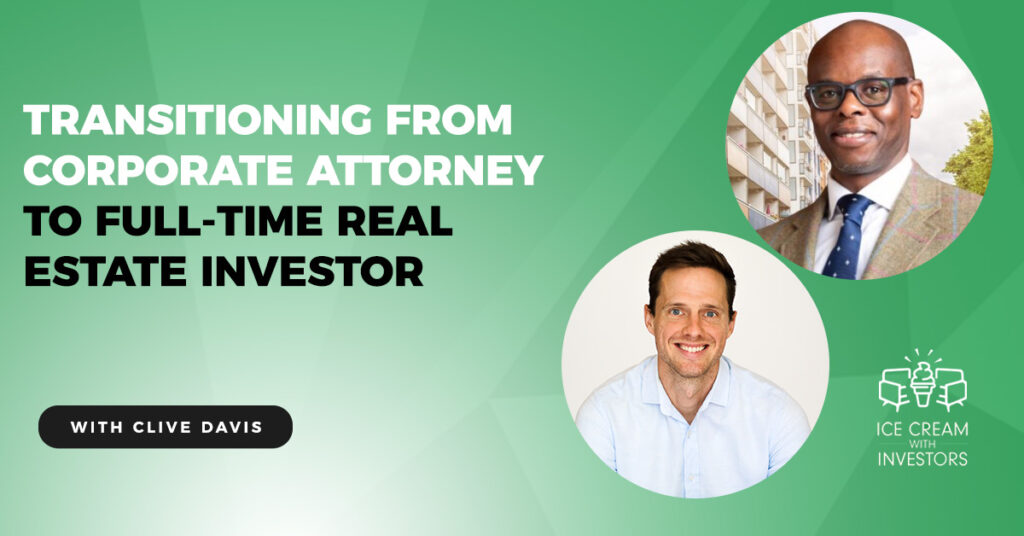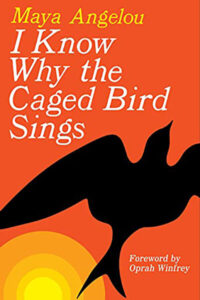At some point in our careers, we realize that we’re just not cut out for the 9-to-5 corporate grind anymore. We want out of the rat race and seek to pursue our passions and gain more freedom and control of our lives. After 20 years of being a corporate attorney, Clive Davis decided to combine his passion and interest in real estate with entrepreneurship. Now, he is the founder of the multifamily syndication group Park Royal Capital. In this episode, Clive joins Matt Fore to share with us his journey transitioning to full-time in real estate. He talks about scaling his portfolio, from multifamily to doing development, and how crowdfunding investments helped him when he was starting out. Addressing the current inflationary environment we are in, Clive then gives some investing advice that can assist us in navigating the changes in the markets. Through it all, he highlights the importance of having your own tribe because, at the end of the day, real estate is a team sport.
—
Watch the episode here
Listen to the podcast here
Transitioning From Corporate Attorney To Full-Time Real Estate Investor With Clive Davis
In this episode, we have Clive Davis on. He is the Founder of Park Royal Capital, a multifamily syndication group. He is also a passive investor, a lawyer, an angel investor and a diversity and inclusion champion. He left his high-paying corporate job as an attorney to go full-time in real estate, and we’re here to talk to him about his transition. Clive, welcome to the show.
Thanks for having me, Matt. How are you doing?
I am fantastic. Clive, we like to start off with the difficult questions here. What’s your favorite ice cream?
It’s Heath Bar Crunch. Any ice cream that has a Heath Bar Crunch in it is going to be a favorite of mine. It could be any flavor, but it’s got to have Heath Bar Crunch clustered in there.
If we’re in Atlanta, where’s the best place we can find a Heath Bar Crunch ice cream shop? I’m assuming the street is going to start with Peachtree Street.
It’s not. There are a couple of places. I don’t know if that’s more of a national chain or whatever, but Bruster’s is a popular spot. I’ll say Bruster’s. There is nothing fancy about it.
Tell our readers, what’s the scoop? What do you do now?
I pay out the investor distributions to my investors who’ve invested in my deal. That’s one of the things that I’ve been focused on now, but in the bigger picture, I am focused on acquiring, owning and operating large-scale multifamily communities. On any given day, I’m underwriting. I’m talking to brokers. I’m touring or going to the assets we own here in Atlanta.
I’m doing something related to asset management, whether that’s meeting with general contractors to talk about different projects at our properties or generally checking up on interior unit renovations or other renovations happening around our properties. I focus full-time on multifamily real estate and our pursuit of assets there. I touched on this, but we’re transitioning now to look at multifamily. We are still in the multifamily space. It’s still the area of focus, but a different animal and we can certainly talk about that some more.
Before we get there, where did your real estate journey begin?
My real estate journey probably began around the age of 13 or 14. We were in the UK. My mom transitioned from the US to New York, specifically in pursuit of the American dream. It was several years before we were able to follow her and reunite the family, but when we got to the US, she had a home in Bradley Beach, New Jersey, which is the closest thing to a US home for me in a home state. She also had a rental property in Queens, New York, that she had bought first and ended up not living there. She rented it out and headed to New Jersey.
On the weekends, I would drive up from New Jersey to Queens, New York, to the rental property. I’d be working on a variety of projects with my father, from wallpapering to painting to anything handyman-related. That was my earliest exposure to this landlord-tenant concept and taking care of a property you don’t live in but yours. That was my first exposure and probably was the spark for my interest in, “There’s this thing called rentals that you can do and people pay you money each month.”
My very first investment property was in 1999. I was a couple of years out of law school, in New York City, and bought a duplex property down in Cape Coral, Florida. This was the first real estate property that I acquired as an investment property. I didn’t live in it. I self-managed it from New York. We didn’t even contemplate the idea of turning it over to someone to manage for me.
My parents were located in Cape Coral, so I had them that I could kind of turn to, to assist with any kind of things that were needed in terms of coordinating and things of that nature. That was my very first investment property and the idea behind that was my parents retired in 1996. It was a perfect way for me to subsidize their retirement. We come from a humble background. Neither of my parents had fancy pensions, packages or retirement savings. In many respects, their children were part of their retirement plan.
In playing my role, it was important to me that they did not want for anything and that anything that I could do, I play my position. I ended up getting that duplex. I set up a checking account. I put both my parents’ names on it. I had the rent going into that checking account, and I told them, “You don’t need to ask me for anything. If something’s broken, if the pool pump needs replacement or what, access your checking account, get the funds that you need and take care of it.”
I wanted to empower them. They’re retired. They’re proud people. They don’t necessarily want to ask the baby of the family for anything that they needed. It worked out perfectly. I was blessed to be a high-paid corporate citizen. At the time, I was a corporate transactional lawyer working at a Wall Street firm. I wasn’t relying on the $800, $900 or $1,000 in cashflow that with the property was kicking off each month. I was able to redirect that into that account and it was a real resource for them. That’s my very first real estate investment and that’s what got me started. It was built from there.
Do you remember how you found that property?
I do. She was with Century 21, but basically, I connected with or someone connected me with a real estate agent. I reached out and said, “This is what I’m looking for. This is the price range.” We ended up buying that for around $75,000 at the time. This was back in 1999. It ended up being a long-term hold because I held it until 2018. I want to say we sold it for $230,000. I can’t remember the numbers, but substantially more and not unsurprisingly, given the amount of time that I held it. I connected with an agent. She would send me some stuff. I’d look at it and when I got a hit, that’s when I dove in a little deeper. We went and picked it up. It was pretty effortless from my standpoint.
From the duplex where you had some family there, you knew the market a little bit and you had a plan for it. Where did you go from there? How did you scale your portfolio from there?
I had a long period of not adding anything to my portfolio and I told people I wasn’t taking it seriously. I didn’t go into it strategically with a plan that I’m going to start with two and then I’m going to add this and then I’m going to go to 8 and 10. That was never my plan. When I started getting serious about real estate and being more strategic about it, that’s when I left Corporate America.
In terms of background, I had a twenty-year corporate career. I started out as a transactional corporate attorney at a Wall Street firm. I then transitioned to being in-house counsel for Pfizer and Pfizer relocated us to Atlanta back in 2005. I then left them. I went on to be a Chief Compliance Officer for another pharma company. All in all, a twenty-year career. At the end of 2016 is when I said, “Twenty years has been a good run. If not now, when?”
Going back as a 13-year-old or 14-year-old kid, I’d always had an interest in real estate. Even when I went to law school, I didn’t necessarily think I was going to practice traditionally. I had always heard that with a law degree, there are so many things that you can do above and beyond being a regular lawyer, whatever a regular lawyer is, because there are so many types of lawyers that you can be.
With a law degree, there are so many things you can do above and beyond just being a regular lawyer.CLICK TO TWEET
The question I was asking myself come to the end of 2016 is, if not now, when are you going to combine your passion and interest in real estate with your flirtation with being an entrepreneur? It was at that point that I said, “Now’s the right time to take a leap of faith. Worst case scenario, I have a safety net of if this leap of faith doesn’t work out, I can probably go find a pretty decent paying job and the family’s going to be okay, the bills are going to be paid and we’re going to eat, but I can’t keep procrastinating and deferring this interest. Now’s the time.”
I parted ways with Corporate America and the W-2 with it and I haven’t looked back since. One of the very first things I did was I went and bought a five-unit. As you know, Matt, 1 to 4 units are residential and five units and above are commercial. The importance of that for me and I felt this firsthand, was that I jokingly tell people, “It’s easier for me to go buy a $30 million or $40 million property than it is for me to buy a single-family.”
The first questions they ask you, the lender now going to say, “We need two years of tax returns and pay stubs for the last 30 days.” If you tell them, “I don’t have a pay stub or I don’t have a W-2,” they’re going to ask you the same question to reformat it because it does not compute for them because they are used to 99% of the people coming in there are people who have a W-2 and can hand over pay stubs.
For me, I knew with a five-unit or above, now we’re talking commercial. Now, the focus is on the property, on that asset and its ability to generate revenue and ultimately pay back the loan on the property. They look at you secondarily and say, “Does he have any bankruptcies on his record? Is there anything that would be a cause for concern,” but they’re not focused on my income. When I bought that five-unit, I don’t even think they asked me what my income was. I don’t even think they asked me what I did for a living. They did their own analysis. I shared with them my analysis of what I was going to do, what the current rents were and what the rents would be after I renovated the units.
They did their own analysis, which was confirmatory of what I was telling them and they were prepared to make the loan. All I needed to do was to ensure that I had the down payment to show up at the closing table. It’s a big difference between playing in the commercial space and residential. I didn’t appreciate that until I left that W-2 behind and knew that I wanted to continue on this path. That was something that I experienced firsthand.
I want to take two things out of that. One, I’m in the process of buying a new home as well and one of the things they look at is not only W-2s but where’s the money coming from and your other assets. Since I have a single-family portfolio that I still have, my DTI ratios look pretty funky. They’re like, “Where’s all this debt coming from? You look horrible from a debt perspective.” Those people aren’t going to understand the nature of the game, but when you get to five units and above, it’s like you’re buying a small business.
They’re going to look at the asset and the business itself and not only your ability to pay it but the asset’s ability to pay it. One of the things I learned about you in some of my research is that you have done some crowdfunding investing as well. Up until the point of 2016, had you already done some crowdfunding investments? Can you talk us through that process?
I had not done any crowdfunding or crowdsource deals investments until early 2017. The way that I found my way to that is I attended a real estate conference. I heard someone talking about self-directed IRAs, which I had not heard of as a term before. Someone got up, they did a 30-minute spiel on self-directed IRAs and I learned during that time that if you’ve got a legacy 401(k) that is sitting around somewhere, either it’s with your old employer or you’ve rolled that legacy 401(k) over to a generic Fidelity IRA, Ameriprise or whatever.
If you’ve got money sitting around like that and you want to take greater control of your retirement funds, there’s this thing called a self-directed IRA. An IRA is an IRA, but a self-directed IRA is a nomenclature surrounding it. This would also apply to a Solo 401(k), but I’m not going to go down that rabbit hole. The beauty of a self-directed IRA is that there are two things you can’t invest in. One is collectibles and I forgot what the second item is.

Real Estate Investor: If you’ve got money sitting around and want to take greater control of your retirement funds, there’s this thing called a self-directed IRA.
Metals, I think.
Yeah, precious metals, but outside of those two narrow limitations, you can invest in anything. I think the guy on the stage gave the example of someone investing in thoroughbred horse semen because he was a horse breeder. He put his retirement funds into a self-directed IRA and invested in that. That’s unique to him and hopefully, he had specialized knowledge. The point is, is that I was now in a position where for many years before, I was always in the position where I maxed out my 401(k). I maxed out employee contributions, but at the end of the day, I put it into one of the limited ten buckets that my employer said I could put it into.
Generally, the advisor would say, “60% here, 30% here and 10% here,” and you let it ride. You just forget about it for the most part. Maybe you open up the quarterly statements when the market’s up. Maybe you don’t open them when the market’s down, but by and large, it’s out of your control. Someone’s making money off of your retirement, whether the market’s up, down or sideways.
For me, it was very attractive as an opportunity to know that W-2 and corporate life are behind me. There’s no excuse for me to be turning over the management of my retirement funds to someone else. I knew that I had this interest in commercial real estate, so I said, “Why would I invest anywhere else but commercial real estate?”
That’s when I found a crowdsource platform and started investing heavily. I invested in probably 9 or 10 deals back to back. By the end of 2017, I was in ten crowdsource deals. These are institutional quality sponsors that are bringing opportunities to the platform. Typically, they’re raising $10 million, $15 million or $20 million over here and then they come to the crowdsourcing platform and they raise an additional $5 million, $7 million or maybe $10 million. It’s a portion of what they ultimately need for their equity. That’s what I did.
The beauty of me doing that is I invested in the types of deals that I envisioned myself doing in 18 months or 2 years from that point in time. I got a firsthand look at how high-level institutional quality sponsors with billions of dollars under management. What are their business plans, how do they attract capital, how do they present deals to investors and what do investor relations look like? What does asset management look like?
All of these things that were somewhat foreign to me or unknown, I got to see as a passive investor what that looked like. You get to see most, hopefully, good, but you also get to see some things that you don’t want to replicate as a sponsor. Communication is one of them. I pride myself on being very transparent as a sponsor on my deals and putting out good communications and being accessible. You don’t always get that, especially with some of the bigger players, where you become a number to them after you’ve wired your funds. There are learning lessons you take away from being a passive investor that you can inject into your own business and your own sponsorship of deals.
There are two things I want to take out of your statements. One is that a self-directed IRA is meant for control. I’m a big proponent of taking control of your financial independence because when we think about a 7% average return in the stock market that every big brokerage firm on Wall Street will state, we don’t think about the ups and downs. We think about, “It’s seven Steady Eddie up into the right,” which I think that’s what real estate gives you. It’s consistent, steady cashflow and appreciation over time.
We’re at a time right now in September 2022, where the stock market is a blood bath out there. People don’t think about if the stock market takes a dip of 50%, it has to gain 100% for it to get back to equal. When you look at some of the wealthy people out there, Mitt Romney and Peter Thiel are two examples of people who’ve used their self-directed IRAs to go invest in areas where they have specialized knowledge, whether it’s horses’ thoroughbred semen, investing in cows or businesses.
I think Peter Thiel wrote a $500,000 check to Facebook from his self-directed IRA and has now made billions off of that. I would encourage people out there that if want greater control to look at the money, they already have in these accounts and decide if they want to take full control of those. Moving to the crowdfunding and the crowdsourcing deals that you have done, you mentioned communication, but has your experience mostly been good?
These crowdsourcing websites are where I’ve learned about how huge the real estate market is. When you look at some of these asset managers and general partners on these sites, they are trillion dollars under assets and multibillion dollars under assets where the most I know is somebody that owns a couple of thousand units sort of thing. Has it been a mostly good experience for you or what are some of the positives and negatives?
My overwhelming experience has been positive. I’ve seen several deals go full cycle now, including a few in Q4 in 2021 and Q1 in 2022. There have been some negatives and one of the challenges that the platforms are dealing with is what do you do when a sponsor goes dark. By going dark, they become non-responsive to investors who are inquiring about K-1s, who are inquiring about progress with the development in the cases of ground-up development and what’s happening. I’ve had some bad experiences in terms of the platform effectively not being much help and you find yourself being on your own. It’s then a matter of whether we, as investors, find one another, rally together and figure out our course of action in the face of this darkness that we’re dealing with.
That’s a negative. It’s a different relationship that you have with that type of institutional sponsor than you have if I’m doing a deal or if I’m investing in another person’s deal. I’ve done that where I have a personal relationship with the sponsor. They’ve either invested in my deals or they’ve partnered with me on my deals. If they’re doing a deal, I’m almost betting on them as much as I am on the actual deal and the specifics.
Now that I have the opportunity and I have those relationships that I’ve built over years, for the most part, the crowdsourced investments are likely behind me that will be more of an outlier opportunity that I might seize upon opportunistically as opposed to being the lion share of what I do from a passive standpoint. In most of the deals I’m in passively now, I know the developer or sponsor personally. I have a relationship. I can text and call them. I can find them if I want to. It’s only a different scenario.
When I was starting out and new to this world, crowdsourcing gave me a point of entry that proved invaluable from an educational standpoint. As I said, it was mostly a positive experience. My retirement funds on balance are in a better place than where I think they would’ve been had I left them in the market. I put a post out on social media showing the decline of the Dow Jones over a few months. It went from around $34,000 to mid-$29,000. It was down plus or minus 16%.

Real Estate Investor: When I was starting out new to this world, crowdsourcing gave me a point of entry that proved to be invaluable.
If you had most of your retirement in the stock market over the last few months, you’re down substantially. That’s without even getting into inflation and/or any of that stuff. It’s another opportunity to remind people about the importance of diversification. I’m not an anti-stock market. I’m not saying everyone needs to pull their money out of the stock market or bond market and put it into commercial real estate, but if you don’t have any exposure to commercial real estate, especially in a high inflationary environment, you’re missing out on a lot of things without getting into tax benefits, appreciation, and into any of that. You’re just missing out. You probably need to think about rebalancing and being better diversified than maybe you are now.
I like to say that real estate is an answer to your financial independence. It is not the answer. While I am heavily led towards commercial real estate specifically, I still have a good chunk of change that is getting murdered in the stock market as we speak. You went from small single-family duplex, five-plex investor to passive investor in some of these crowdfunding websites to raising money for your own multifamily deals in the Atlanta area. Now, you’re starting to get into development. Talk us through the transition from multifamily value add to now doing some development.
I think of it as an expansion of what I’m doing. I tell people that I’m not an overnight success because I didn’t say, “I’m going to sponsor deals,” and the deals land in my lap. It took me the better part of two years, including a dormant period that COVID was playing with the market and messing a lot of things up. Nonetheless, it took me the better part of two years from my very first offer that I submitted on a multifamily deal to get in and awarded that first deal.
We closed that first deal back in November of ’21. It was 244 units. We acquired that for $30 million. The law of the first deal, the week that we closed on that first property, we got awarded the second one. After knocking on the door for the better part of two years and being a runner-up or a bridesmaid, but never a bride, we finally get a deal and rapidly behind that the same week, we get that second deal.
Value-add, that’s the business model I continue to pursue and I’m still interested very much, so despite what’s going on in acquiring more value-add opportunities, I had always known that I was going to get into the development side of things. It was only a matter of when, not if. Some opportunities have just come my way and we touched on the fact that I’ve been blessed to have the opportunity to be invited into several ground-up constructions of multifamily properties here and around Atlanta.
It’s a very different business model, but it’s another form of diversification. We were talking about diversification. Not only am I focused on value-add, but now I’m expanding my multifamily focus to ground-up construction. A different business model, higher risk, but hopefully, higher reward if done correctly. Right now, I’m fine playing more of a junior role to a lead developer and learning the ropes along the way. Ultimately, taking that and getting to a point where I step into the shoes of being a lead developer, but I’m thrilled with the opportunity. I’ve got some exciting opportunities that I’m involved in and there’ll be more information about that down the line.
Can you highlight some of the differences between value add acquisition and development? From my perspective, it’s a longer game where you don’t see the results until the end. You have to be consistent in your actions every day, where a value-add is more like, “I get a property now. There are some levers I can go pull. Let me go pull those.” It’s a day-in and day-out grind of seeing your results.
When I think of value-add, the timeline of value-add. Let’s call it 90 days plus or minus from the time that I submit an offer until I close a deal. There’s an intense period of underwriting the deal, stress testing it, touring it, negotiations, getting a purchase and sale agreement signed and all of those things. There are lots of plates being juggled and then you finally get to the closing table and you climax. You close the deal and now you transition to, “We own this thing. We got to manage the takeover. We got to implement our business plan. We’ve got to manage this asset.”
The timeline is much more predictable. You know the phases regardless of who you are as a sponsor. Every sponsor is going to pretty much have to do the same things in terms of their value-add business plan. When it comes to the development side of things, the timeline is much longer. Whenever someone comes to me and says, “Are you interested in this development opportunity?” Whatever they tell me the timeline is, I’m going to add six months to it.
If they come to me and say, “It’s going to be 12 to 18.” In my mind, I’m like, “It’s two years. Is the land already entitled or are we going to have to entitle it after we acquire the land? Go through zoning and all of those things or are we further along in the process?” It’s a longer timeline. Hopefully, with a healthier payoff at the end of all of that, but you go into it, you know that it’s going to be a cash drain. There is going to be no cashflow because it’s going to be money paid out to all of the parties that need to be paid from the architects to the surveyors to everyone that needs to be paid as part of that development process and as part of the development-related costs. That’s before you’ve even broken ground.
You then break ground and then you’ve got to go through all of the challenges of construction, material costs, labor shortage and all of the things that you potentially might deal with. Hopefully, at the end of two years, plus or minus, you’ve got a property that is completed and now, it’s about lease-up. We got to get occupants into these units and depending on your business model, are we going to keep it, cashflow it or do we have an exit plan that has us exit now that lease up has commenced? It depends on the business plan, but it’s all in all a much longer timeline with the payoff being much further out than value-add, which is a little bit more immediate to you from the time of the pursuit.
The first question I would ask any developer is, is it entitled? Before I even look at a development deal, I want to know that it’s titled up or zoned out properly because I think that’s where some people can get stuck because that feels like a backroom game to me. One of the things that I found interesting about you was how you’ve built communities.
I like to say that commercial real estate is a team sport and you have to understand what role on the team you’re going to play. Some of the lessons I’ve learned from you is that you can go build your own team or your own tribe and bring people into the fold. You don’t have to go out there and see what’s already out there. Can you talk a little bit about how you’ve been able to build tribes and share your message along the way?
First of all, it’s a team sport. The best-performing teams pull talent from wherever talent can be found. I found that personally in terms of the teams I’ve assembled to take down the deals I’ve done, a couple of which I mentioned, but more broadly in terms of team and tribe and community. One of the things I did is that I attended a conference several years ago and found myself in conversation with some fellow African-American investors in the audience.
The best performing teams pull talent from wherever talent can be found.CLICK TO TWEET
We started up an email chain after that conference and it was very cumbersome because we were sending emails and trying to communicate with the 607 of us. Someone in that group said we should start a platform or someone should start a platform where we can have a community, share information, encourage one another in this journey and share success stories.
I ran with that and I started the African American Multifamily Investor Network on Facebook. I’ve been very intentional about growing that group and not only trying to get to 5,000 or 10,000 for the sake of getting into a huge number. I’ve been very intentional about ensuring that the people who join the group have an interest in multifamily. We don’t talk about wholesaling. We don’t talk about flips and any of that. We try and confine the conversation to multifamily.
As with you, Matt, I’m a member of probably 2 or 3 dozen multifamily-related groups on social media, but this one is very niche and the rationale or the thought process behind it was that African Americans are underrepresented in commercial real estate. The percentage is a measly plus or minus 2% of the roles within the broader commercial real estate world are occupied by African-Americans.
I think the same underrepresentation type is found in the investor pool of folks who are invested in commercial real estate. A lot of that is a lack of knowledge, information, role models and visibility or proximity to people who are doing this. I wanted to cultivate and curate a space where folks could go and see people from all walks of life in all different roles under that commercial real estate umbrella pursuing multifamily or facilitating multifamily in some way.
We’re now a group. We’re up to about 1,300 members and if nothing else, we’re a cheerleader for folks to do deals. We’re a resource, facilitator, or connector within that community. I’ve been happy with what we’ve been able to do and some of the success that people have gone on to do. The relationships, connections and networks that have been created because network is everything. Relationships are everything. Sometimes all you need is an introduction to, “Are you in Baltimore? He’s in Baltimore. You guys should chat.” Simple things like that have proven to be very useful to the membership and we continue to grow and welcome folks into the group that can add value in any way.
Part of that, too, is distilling the lessons of what you’ve learned about generational wealth to people who might be in the wholesaling or the single-family or the fix and flip into saying, “Let’s use those profits for the generational wealth. By the way, this is a whole nother segment of real estate where you can get some of those long-term legacies passed down wealth.”
Once you’re talking to them about multifamily, you are preaching the values of scale. If you’ve got a flipper or someone who, every 60 to 90 days, are flipping a house and they’re putting all their sweat equity into it and all of that, if you have a conversation with them about, “Why don’t you consider a 20-unit or 32-unit?” you start to open their eyes to what’s good and that serves an immediate need. However, if you want to create generational wealth and leave a legacy, it’s going to be very difficult doing that a flip at a time.
If you really want to create generational wealth and leave a legacy, it’s going to be very difficult doing that a flip at a time.CLICK TO TWEET
You are opening up their aperture to something and I tell people that real estate is not rocket science. You can do basic arithmetic and understand the concept of people need somewhere to live and someone needs to provide that. If you are that person who’s the provider of that, there’s a market for that and there’s a value that people put on that.
I’ve done some things in my life that are way more complicated and way more sophisticated than what I’m doing now. If you can do basic math and you have any degree of personality, you can do what it is that we’re doing. Someone that has the hustle and discipline to wholesale and to flip and to work hard, my conversation with them is take all of that, apply it to multifamily and you can achieve success at a much bigger scale. Your impact can be bigger. The legacy you’re creating will be bigger and potentially more impactful.
That’s generally the tone of the conversation that I’m having with anyone who’s in a single-family. I’m trying to get them up that ladder because I never invested in single-family. My very first investment was a duplex. The only single-family I ever invested in were the ones that were my personal residence. Maybe I left it and maybe I rented it out after I left, but there was never an intention of I’m going to go one family at a time. I started with a duplex and I’ve only grown from 2 to 5 and leaped to 244 and 200. That’s the ballpark that I’m playing in now.
That’s why you’re way smarter than me because I started building out a single-family portfolio before I got into the bigger stuff. This is a fantastic conversation. I want to switch us now into our last round. We’re calling this the Five Toppings. Our first one is, what is your favorite book or what is a book you’ve read that’s giving you a paradigm shift?
My favorite book has nothing to do with real estate. My favorite book is I Know Why the Caged Bird Sings by Maya Angelou. That was the first book that I recall reading from cover to cover. I dabbled and read a few pages of lots of books, but that was the first book that had an impact on me that I read cover to cover. On the real estate side and I have it on my shelf, I would say the Best Ever Apartment Syndication Book is probably the most relevant to what I do and is probably been one of the best book resources that I’ve had so I would use that one
You are the first person to say a Maya Angelou book. Our second one is I believe that the person you become ten years from now is directly correlated to the habits that you have and the things you do every day. What are some of the habits that you do every day?
I’ve not worked out since my college days, which is many years behind me now, but one of the things that I do because, just like dieting, I think it is a waste of time. If you’re not going to adapt your lifestyle, doing a binge diet that you’re doing for three months and then you can’t sustain it because it’s not a realistic lifestyle, that’s not doing anyone any favors. Similarly, that’s my approach to working out.
I try and do calisthenics of some sort or another every day, either in the morning or at night before I go to bed. If I haven’t done it in the morning, I’m trying to do it before I go to bed. Simple things like the old-fashioned pushups, sit-ups, getting on the floor and doing something. Even if I don’t make it to a gym or I don’t get out to run, fortunately, I was able to run this morning. I ran my 4 miles, but if I don’t get to do that, I know, at a minimum, I’m going to push out some sit-ups and get that in. That’s a daily thing for the most part.
Our third one is, what’s the best piece of advice you’ve ever received?
The best piece of advice, which I’m especially taking these days, is to control the things that you can control and not stress about the things that you cannot control.
I had a coach one time who said, “Control everything you can control and manage everything else.” Our third one is, what are you most proud of in your life?
It’s my children and what they’ve been able to accomplish in their short lives. Our goal is or should be to put our children in a position to outperform us. Whatever we were able to achieve, we should set them up so that they can make us embarrassed by how much of a slacker we were relative to what they were able to accomplish.
I have four children. The oldest is living in Cali, Columbia teaching English. She’s there on a Fulbright. She graduated college in ’21. She is doing some phenomenal things. We sent off my younger daughter to the School of the Art Institute of Chicago. She just started there as a freshman. I’ve got two boys and great boys, too, doing their own thing. My kids, what they’ve done and the impact that they will have on their community in their society, if I don’t do anything worthwhile, I know that I can be proud of what they’ve done and what they’re going to do going forward.
Our last one is if you could sit down and eat a bowl of ice cream with anyone, dead or alive, who would it be and why?
There are a number of people I could pick. I’m going to pick Nelson Mandela. Because I think the way that the world is now, we need some statesmen of the stature of people like him, who, despite all that he went through, was such a humanitarian. Also, he could sit down with his enemies who try to do very bad things to him and reach some kind of compromise where others would think there’s no way that you can find a compromise. I think we’re in such a divisive time. I’d love to sit down over ice cream, pick his brain and get his thoughts on, “What do you make of what’s going on here?”
I sometimes get this question back and he’s one of the people I name for the exact same reason. Somebody that had every reason to hate his enemies and instead, after twenty years of suffering in prison by himself, came out and not only extended a hand but brought them into the fold to say, “We’ve got to lead this country together.” Clive, this is an amazing conversation. If our readers wanted to reach out to you or learn more about you, where’s the best place we could point them?
I’m active on social media like LinkedIn, Facebook or whatever have you, but the best way to get ahold of me is via my website. It’s ParkRoyalCapital.com. If you go to my website, you have an opportunity to learn more about what I’m doing and some of the recent deals I’ve worked on. You also have the opportunity to book a call via Zoom or a regular call with me. I love talking about real estate, in case you couldn’t tell. I’m always talking to people regardless of where you are in your journey. I’m always willing and happy to share my journey and, hopefully, be a resource to someone who is in some phase of that journey.
Clive, thanks for coming to the show.
Thanks, Matt. I appreciate it. It’s been a good conversation.
Important Links
- www.ParkRoyalCapital.com
- https://www.LinkedIn.com/in/clivedavisesq/
- https://www.Facebook.com/groups/africanamericanmultifamily
- I Know Why the Caged Bird Sings
- Best Ever Apartment Syndication Book
- Facebook – Clive Davis
About Clive Davis

Clive Davis the Founder of Park Royal Capital, a multifamily syndication group. Clive is also a Passive Investor, a Lawyer, an Angel Investor, and a Diversity Equity Inclusion Champion. He left a high-paying corporate job as an attorney to go full-time in real estate.






